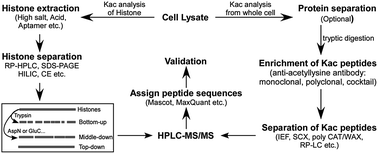Protein lysine acetylation analysis: current MS-based proteomic technologies
Abstract

* Corresponding authors
a State Key Laboratory of Medicinal Chemical Biology, Nankai University, Tianjin 300071, China
b
Department of Chemistry, Nankai University, Tianjin 300071, China
E-mail:
Zhangkai730@yahoo.com.cn
c
Institut für Biochemie und Molekularbiologie, Universität Freiburg, Stefan-Meier-Straße 17, 79104 Freiburg, Germany
E-mail:
enguo.fan@biochemie.uni-freiburg.de, faneg1107@yahoo.com.cn
Tel: +49-761-2035266

 Please wait while we load your content...
Something went wrong. Try again?
Please wait while we load your content...
Something went wrong. Try again?
K. Zhang, S. Tian and E. Fan, Analyst, 2013, 138, 1628 DOI: 10.1039/C3AN36837H
To request permission to reproduce material from this article, please go to the Copyright Clearance Center request page.
If you are an author contributing to an RSC publication, you do not need to request permission provided correct acknowledgement is given.
If you are the author of this article, you do not need to request permission to reproduce figures and diagrams provided correct acknowledgement is given. If you want to reproduce the whole article in a third-party publication (excluding your thesis/dissertation for which permission is not required) please go to the Copyright Clearance Center request page.
Read more about how to correctly acknowledge RSC content.
 Fetching data from CrossRef.
Fetching data from CrossRef.
This may take some time to load.
Loading related content
